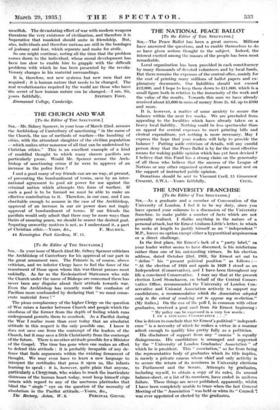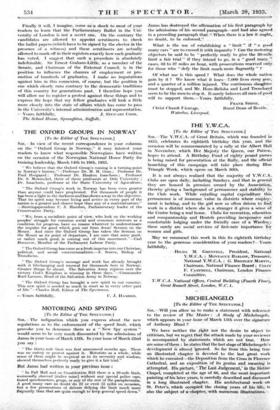THE UNIVERSITY FRANCHISE
[To the Editor of THE SPECTATOR.] - SIR,—As a graduate and a member of Convocation of the University of London, I feel it to be my duty, since you have opened your columns to a discussion of the University franchise, to make public a number of facts which are not generally realized. I dislike anything in the nature of a personal attack, but Sir Ernest Graham-Little's letter, in which he seeks at length to justify himself as an " independent " M.P., leaves no option except either a hypocritical acquiescence or a direct challenge.
In the first place, Sir Ernest's lack of a " party label," as your leader writer seems to have discerned, is his misfortune rather than one of his outstanding virtues. In his election address, dated October 23rd, 1981, Sir Ernest set out to. " define " his " present pOlitical position " as follows
At the election of 1924 and again in 1929 I stood as an Independent (Conservative), and I have been throughout my, life a convinced Conservative. I may say that at the present election Lord Stonehaven, on behalf of the Central Conser- vative Office, recommended the University of London Con- servative and Unionist Association actively to support my candidature, a recommendation which the Association adopted only to the extent of resolving not to oppose my re-election." (My italics.) On the eve of the poll I, in common with other graduates, received a post card from Sir Ernest beginning :
" My policy can be expressed in a very few words :
I AM A LIFE-LONG CONSERVATIVE . . ."
One is driven to conclude that Sir Ernest's political " independ- ence " is a necessity of which he makes a virtue in a manner adroit enough to qualify him pretty fully as a politician.
His disclaimer of support from any " caucus " is equally disingenuous. His candidature is arranged and supported by the " University of London Graduates' Association " of which he is president. This " association," so far from being the representative body of graduates which its title implies, is merely a private caucus whose chief and only activity is to secure the return of its nominees in University elections to Parliament and the Senate. Attempts by graduates, including myself, to obtain a copy of its rules, its annual balance-sheet, or a list of its members, have ended in uniform failure. These things are never published, apparently, whilst I have been completely unable to trace when the last General Meeting of the " Association " was held or when its " Council': was ever appointed or elected by the graduates. Finally it will, I imagine, come ag-a shock to :most of your readers to learn that the Parliamentary Ballot in the Uni- versity of London is not a secret one. On the contrary the candidates are allowed to appoint scrutineers to. check the ballot papers (which have to be signed by the elector in the presence of a witness) and these scrutineers are actually allowed to mark off in their registers exactly how each graduate has voted. I suggest that such a procedure is absolutely indefensible. Sir Ernest Graham-Little, as a member of the Senate, and Chairman of the External Council, is in .the position to influence the chances of employment or pro motion of hundreds of graduates. I make no imputations against him in this connexion, of course, but the position is one which clearly runs contrary to the democratic traditions of this country for generations past. I therefore hope you will allow me to register a protest against these things and to express the hope that my fellow graduates will look a little more closely into the state of affairs which has collie to pass in the University's internal administration and representation.
—Yours faithfully, J. STEWART COOK. The School House, Sproughton, Suffolk.







































 Previous page
Previous page